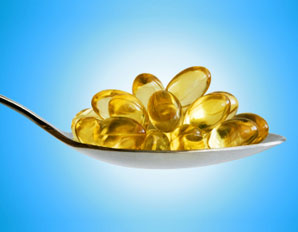Fish Oil Dosage
Pretty much everybody has heard of the benefits of fish oil, but I do get a lot of questions about what the best fish oil dosage is. It actually gets a little tricky figuring out your dosage properly; it isn’t just a matter of giving you a simple number. But, don’t worry, we’ll walk through it by steps and you’ll be taking the right amount of fish oils in no time.
Essential Fatty Acids
The most important thing to remember when you’re buying fish oils and calculating the correct dosage is to understand that you’re taking fish oils for the essential fatty acids (EFAs) in them. EFAs are what they sound like; fats that are necessary (essential) to the proper biochemistry of your body.
In this case, we’re talking about two EFAs: DHA (Docosahexaenoic acid) and EPA (Eicosapentaenoic acid). You don’t need to remember the big ugly hairy names, that’s why we use acronyms. In fact, you barely need to remember EPA and DHA… it’s the only acronyms that will be listed on the label in the dosage section.
What you DO need to remember is, to add these amounts up on the label to see exactly how much useable fish oil you’re getting. You see, fish oil isn’t 100% EPA and DHA. The purity varies wildly from brand to brand. So, in order to accurately assess your fish oil dosage, you need to check the label of whatever product you’re buying. The good quality products go about 50% purity; that is, if you take 1000 mg of fish oils, you’ll get 500 mg of EPA and DHA (total).
So the question is not, what should my fish oil dosage be, but what dosage of EPA and DHA should I be taking?
Fish Oil Dosage = EPA and DHA Total
Now that we have that sorted out, just how much EPA and DHA do we need? As usual, the answer is, it depends. How good is your diet? People eating a whole foods diet get some EFAs from their food, and don’t need as much Omega-3 fatty acids (that’s the name of the kind of essential fats fish oils provide) as someone who’s living off of processed foods.
Are you taking fish oils for simple health maintenance, or do you have a symptomatic condition you’re hoping to ease with Omega-3 fatty acids? Your fish oil dosage will need to go up considerably if your health has already deteriorated enough that you are having symptoms.
General Rule For Fish Oil Dosage
- If you’ve got a pretty good diet, you want to keep your costs down, and you merely want to take fish oils for general health maintenace, a total EPA + DHA dosage of about a gram to a gram and a half a day is generally sufficient.
- If you need to take it up a notch because you have a mild to moderate condition you’re hoping to help with Omega-3s, or you have a lousy diet, or you don’t mind a little extra cost to have even more benefit from your fish oils, your fish oil dosage should be more like 3 grams a day (again, EPA and DHA combined).
- Highly symptomatic individuals may need 6 grams or more a day to get their problems under control. For example, my patients with arthritic symptoms work their way up to six grams a day until their symptoms start to subside, and then they slowly reduce their dosage (so long as they still have reduced symptoms) until they reach a maintenance level of more like 1 to 3 grams/day of EPA and DHA.
I strongly advise that anyone just starting out on fish oils makes it a point to SLOWLY add them in to their diet. Trying to gobble down large amounts of fish oil capsules right away will usually result in something called “fishy repeat”, which is a fancy way of saying you burp up fish oil taste. It’s as gross as it sounds.
Avoid that by gradually increasing your fish oil dosage over time. Start with one capsule a day for a week, add a second for a week, and so on until you reach your desired dosage level.
Remember, your fish oil dosage is determined by your diet and your goals, and is calculated by adding the amounts of EPA and DHA on the label (NOT the number the company claims is “fish oils”).
Stay healthy!


[…] Increase your intake of linoleic acid. This is an essential fatty acid (fat) that the body makes from EPA and DHA, the main “good” fats in fish oil. So, read this article on fish oil dosage. […]